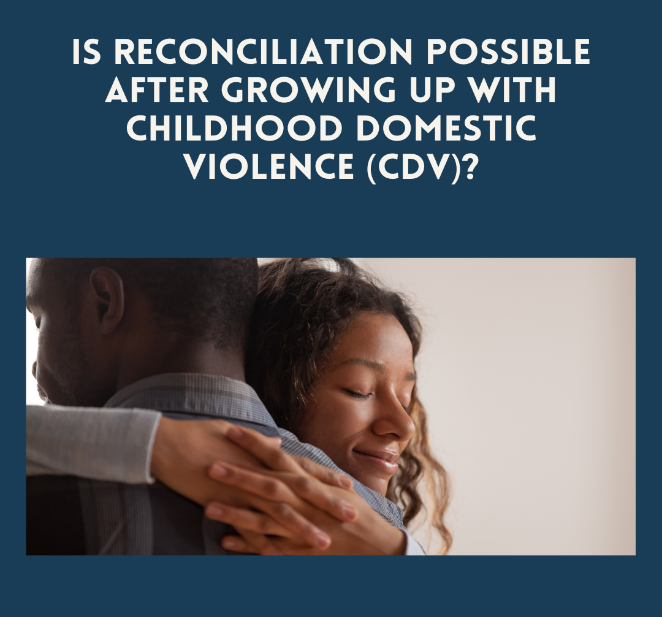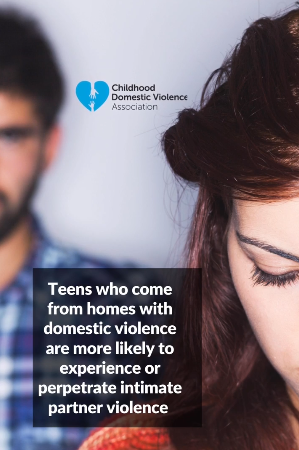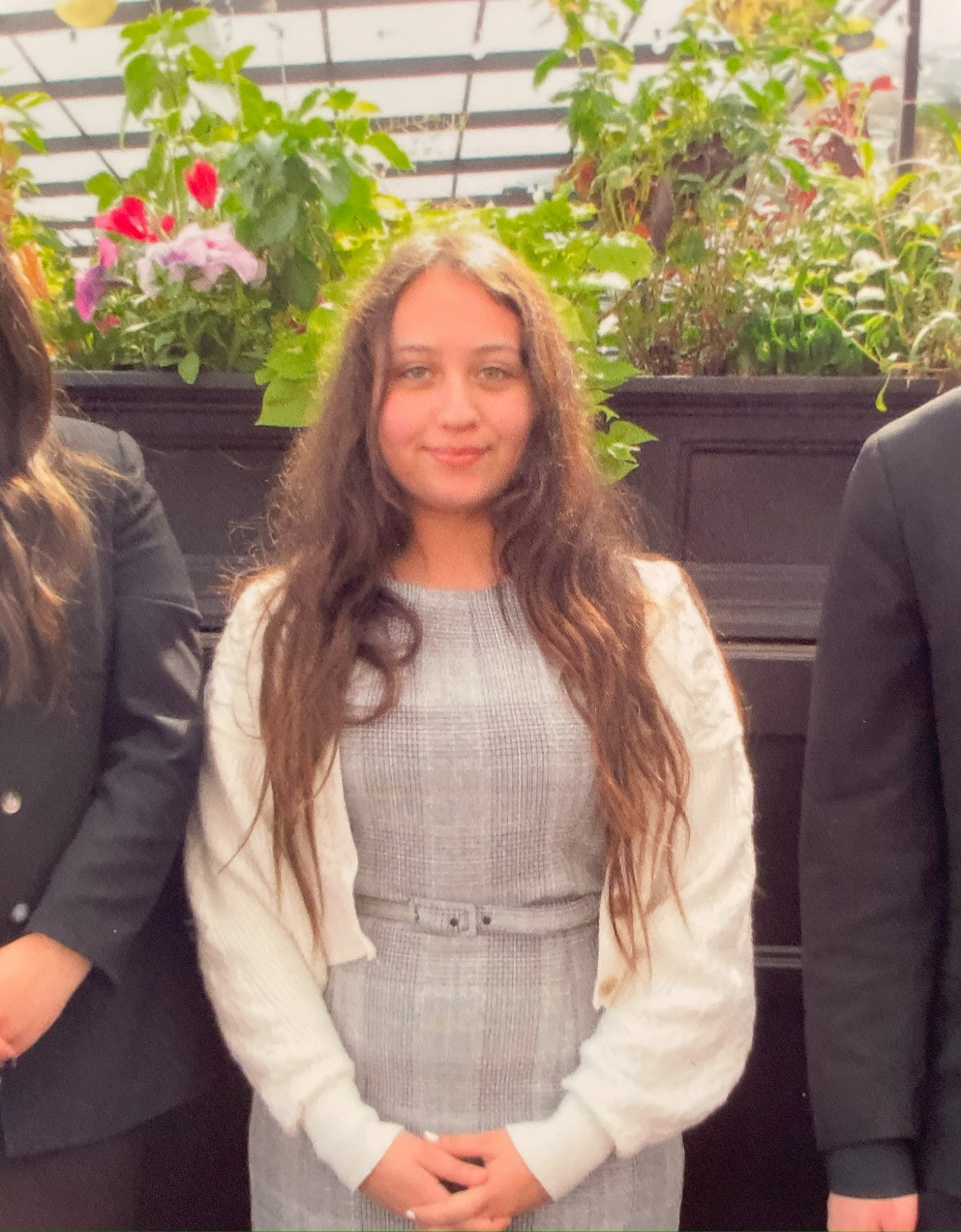 |
One of our CDV Champions, Shirley Sanguino, has been writing blogs for us since she first provided her story back in January 2023. Her latest blog focuses on the idea of reconciliation with family after growing up with Childhood Domestic Violence (CDV). |
Can it be done? Is forgiveness possible, or even necessary and healthy? And what is the path to move forward to heal from any triggering effects and lingering pain?
Like many adults who find CDVA, Shirley had an idea that her childhood was unlike most children’s, in that she grew up with domestic violence. Also, she knew that there was still pain and a sense of something missing – a gnawing feeling – that her childhood was still impacting her years later.
Just as Shirley did, many have found that putting a name to what they experienced growing up helps them start their journey to a better path towards healing and learning. When you grow up living with domestic violence, that’s Childhood Domestic Violence (CDV). And this childhood adversity can negatively impact all areas of your life, leaving you to struggle mentally and physically. It does not always allow you to be the person you should be as an adult.
Shirley’s story of reconciliation and forgiveness
|
Many of us who have suffered from childhood domestic violence (CDV), may have experienced it via one of our family members. For some of us, it may be someone as close as our parents. Some of these people leave our lives permanently, never to resurface. Others come and go, and we find ways to manage our feelings around it. Some of us forgive, and some of us may not be able to – and that is okay. What happens when we come back into contact with the person who caused so much pain and harm? What are the long-lasting effects of CDV that may show up in our adulthood when we encounter such people? |
|
The Fawn Response is common amongst those who grew up with CDV
We have all certainly heard of the fight-or-flight responses. However, were you aware that there are two other responses that humans have when faced with a fearful situation? The first one is freeze, and as the name implies, it is when one is shocked into inaction. This type of response is accompanied by various physical sensations, such as feeling cold or numb, a pounding heart or decreased heart rate, a sense of dread, and restricted breathing amongst others.
Fawn, which is another type of response, and happens to be quite common amongst those who have survived childhood trauma. This response is appealing to the abuser or the threat to avoid harm. With domestic violence, survivors and children who witnessed it may have learned to stay out of harm’s way by appeasing the abuser. This can be by saying something that the abuser may want to hear, going along with what is happening, or just doing anything to prevent abuse.
This type of response is usually developed in early childhood and can be difficult to identify. However, some of the following may help you see if you fawn in response to a threat:
- Difficulty identifying feelings, and looking to others for guidance on what to feel
- Feeling as though you do not have an identity
- Constantly pleasing others and ignoring your feelings and concerns
- Saying no is difficult
- Difficulty with developing appropriate boundaries or with sharing your opinion
In Reconciliation, is forgiveness…Is it Necessary?
According to a study, forgiveness can be influenced by the personality of the abuser. For example, survivors were found to be more empathetic and forgiving toward abusers who had more dominant personalities, compared to abusers who had psychological problems. On the broad spectrum, general forgiveness can have beneficial effects on our health, according to Johns Hopkins.
Some of these benefits include lowering the risk for a heart attack, reducing pain, cholesterol, and anxiety, blood pressure, anxiety, depression, and stress. Additionally, it can help improve sleep.
Despite these benefits, this does not consider forgiveness when it comes to trauma recovery. We often hear many clichés about forgiveness and how it will help with moving forward. However, there are many reasons why it is not needed to heal and perhaps is not viable for those who grew up with CDV. For example:
- It can inhibit safety, and diminish the wrongdoing
- It can focus on the abuser, rather than the survivor
- It can blame the survivor and create shameful feelings
- It can encourage silence and the avoidance of finding treatment
- Your needs are the priority
- You don’t want to forgive
Connecting to Real Life – My CDV background
I have shared my story about growing up with domestic violence on our website before, if you haven’t read it, I invite you to do so! In a gist though, I grew up in a home where my brothers and I often watched my father hit my mom, leaving her bruised all over. Once my mom had enough, we fled our home country to escape to the United States seeking refuge.
I moved to the United States when I was five years old. For many years, I did not see my father. I think the first time I saw my dad after we left was at least…half a decade later. Out of all my siblings, I have always had the most strained relationship with him, and the most resentment. This may be because as the youngest, my dad was missing from the picture – I never spent time with him. It’s also possible that as my mom’s only daughter, I was closer to her.
Meeting my father’s new family when I was 14 years old
Regardless, I always felt a deep void and a profound level of resentment for my father. By the time I was a teenager, my father sprung on us the fact that he had a new spouse and a new child. I remember feeling even more resentful. As I lingered in the back, I would watch as my dad held his new wife’s hand, and his son’s hand, and walked with them in his new family. At the age of fourteen, I found myself wondering why he couldn’t have been that same person with us.
|
As I continued to grow and began dating, I noticed the effects that his wound had. I dated terrible people, and one of my longer relationships was emotionally abusive. As time went on, I became more and more detached from my father. |
 |
At nineteen, I went back to my native country for the first time in 14 years. It was beautiful but being there only reopened the wound further. I stayed with my father and his new family, and I saw what hadn’t been. My father had bought a home with his new family, they had a housekeeper who made them meals, they had pets, their son went to a private school…and he had everything he asked for.
I was hurt. I couldn’t believe the 180 degrees my dad had done. Despite being happy for his wife and son, I was hurt for my siblings, my mom, and myself. We had experienced days without food, and months of him not paying rent, and we never got what we wanted. How was it fair?
To add to it, on the way back from a local flight we had, my father got upset at me and took all my clothes out of my backpack throwing them on the airport floor. He was upset and yelling at me, and I cried. It was a strange experience. Truth be told, after that trip I vowed I would not go back because Colombia has become a symbol of pain for me. Despite how often he asked me to go and how often my brothers pushed me to go, I always refused or made excuses.
CDV’s lasting impact – a triggering visit
I’m now twenty-three, and not much has changed. My father came to see us this year. When he confirmed he was coming, I experienced a weird sensation. I cried. Not of happiness, but of uncertainty. On my way to the airport, I found myself having an anxiety attack. I washed my car before picking him up, all to ensure that he wouldn’t judge my car. I called my mom to let her know I was shaking, and that I wasn’t sure why. She asked, “Could it be you’re afraid that he will get upset at you for something?” She was probably right.
I originally had planned to spend five days with my dad and half-brother, but by the second day, I had had enough and decided to leave on the fourth day. Why? Well, for many reasons. Sometimes, he ignored me and only took pictures with his son. Other times, even as an adult, it hurt to watch him do almost everything for his son, even though his son was big enough to do some of those things on his own. I was never babied like that by him, and it stung to see that.
The final straw was when I cried at a dinner we had because I felt pressured by him and everyone at the table. When I came back, instead of comforting me, he sternly said, “You need to have better control of your emotions. Especially in your career. You are ruining it for yourself and everyone. Don’t be weak.” Those words hurt.
I have been told my entire life that I am too sensitive and hearing them from someone who was so incredibly absent my entire life upset me. How dare he? He doesn’t know me…I thought. That was it. From that moment on I detached. I was cordial until I could leave. Funny enough, on the day I left, I did not get a hug, I did not hear a “I’ll miss you”, or “I love you”. I left, and it seemed like he was saying goodbye to a stranger.
The aftermath of CDV and the attempt of reconciliation is not always one with closure
The aftermath? As someone who already struggles with major depression…my dad’s visit left me feeling empty. I felt such a strange depression, and I wondered if his coming had even been a good thing. It seemed more detrimental than good.
As I write this, it has been about a month since he came and went. I still feel strange, and I almost wish he had not visited. At the same time, I feel like it was a good thing that he did…because I don’t think I will ever be back to Colombia, and I don’t know if he will ever come back here.
Did I get closure? No. I have been on a healing journey for years, but sometimes, our wounds never leave. They just get manageable.
Therapy for handling flight or flight responses can be helpful
Did you feel as though you identified with either the freeze or fawn response? Despite these coping mechanisms being something we learn at an early age, there is hope. Treatments such as talk therapy, eye movement desensitization and reprocessing (EMDR), and cognitive behavioral therapy (CBT) can help you learn new skills in these areas.
It is important to remember that forgiveness is an option that is one of many choices. Whether you decide to forgive or not, your path to healing will not hinder you in any way.
—————————–
Shirley’s path to healing from the major childhood adversity of CDV continues and may continue for much of her life. What she has learned first and foremost is that she is strong and that she can learn from her mistakes.
She understands what forgiveness is and that it may not work best for her and her father to come to terms and reconcile. She admits that this is okay. When she first wrote her story back in January of 2023, she had mentioned that she found her own form of self-care – it was a means of forgiveness, though not direct – she wrote letters to her father and then burned them. This act gave her an outlet of self-expression – something amiss in her childhood – and helped her release resentment and negative thoughts within her mind. This is forgiveness of yourself.
Did you know that sharing your story of your experience growing up with domestic violence can be curative? Conversation transforms meaning – tell us your story – anonymously, or not. Share it so that others struggling with CDV can also know they are not ALONE!
Share your story here!

